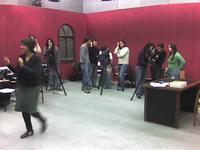Our goal is to engage in this creative process while simultaneously exploring the intellectual and artistic history of others who have explored similar questions. There are at least four overlapping threads of background material that will support and inform the work of both student groups, as they proceed towards and through the video exchanges.
1. Cultural, historical, and geographical background of the culture with which the students are working.
2. A history and survey of Western, and particularly US alternative media, especially independent and personally produced films that have strong autobiographical aspects, as these can serve as models and touchstones for the works produced in the class. A bridge will also be made between the surrealist films of the '20's and the avant-garde films of the '50's to the present. These works speak to the uniqueness and artistic value that small, non-commercial productions can have, which is a critically important piece of knowledge to students who's main viewing experience is often high-budget features and television.
3. An exploration of the tools, methodology and history of Anthropology, which has been the academic discourse most closely tied to the understanding of other cultures. We will ask you to become anthropologists, to learn a critical way of thinking about and viewing others and ourselves. Moreover, anthropologists have a long history of working with artists and incorporating experimental methods into their work. This aspect of the project will allow us to engage the intellectual discourse that surrounds the work that we will be undertaking, and it will hopefully also give us the tools to analyze the work that our creative exchanges produce.
4. A brief overview of travel as both metaphor and actuality in our lives, as the work that we will be doing in this project is a form of "virtual travel," and as travel is one of the dominant metaphors of film and literature. Particularly during the current era of globalization – when peoples, products, ideas, visual images and emails traverse the globe at amazing speeds – travel is one force transforming all cultures around the world.


